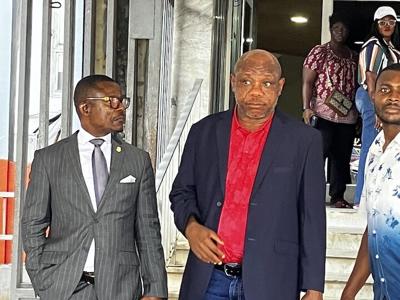Supreme Court to Hear Former Fin. Min. Tweah's Economic Sabotage Case on July 1, 2025

Friday, June 27, 2025
In a long-anticipated development, the Honorable Supreme Court of the Republic of Liberia has scheduled July 1, 2025, to hear arguments in the high-profile petition for a writ of prohibition filed by legal counsel representing former Minister of Finance and Development Planning, Samuel D. Tweah, Jr., and three co-defendants in connection with an alleged economic sabotage case. According to a formal Notice of Assignment issued by the Supreme Court, the hearing will begin promptly at 11:00 a.m. on the scheduled date. The notice reads: “You are hereby commanded to notify the Parties in the above-entitled Cause of Action or their Legal Representative(s) that the Honorable Supreme Court of the Republic of Liberia will hear ARGUMENT in said cause on the 1st day of JULY A.D. 2025, at the hour of 11:00 a.m.”
The case stems from allegations of economic sabotage and financial improprieties during Tweah's tenure as Finance Minister. The legal proceedings have attracted significant national attention due to the high profile of the accused and the potential implications for public accountability and governance reform. In February 2025, Criminal Court ‘C’ Judge Roosevelt Willie was designated to preside over the trial. However, before proceedings could move forward substantively, the defense team representing Tweah and his co-defendants filed a petition for a writ of prohibition a legal mechanism seeking to halt or delay lower court action on the grounds of jurisdictional or procedural errors. The petition argues that the charges brought against Tweah and the other defendants either lack sufficient legal foundation or were improperly filed. While specific details of the petition have not been made public, legal analysts suggest the defense may be challenging the process by which the indictment was approved or questioning the jurisdiction of the court to hear certain aspects of the case. The Supreme Court’s upcoming hearing will focus on oral arguments from both the prosecution and the defense to determine whether the writ of prohibition should be granted. If the writ is approved, the ongoing trial in Criminal Court ‘C’ could be halted or delayed, potentially altering the course of the entire case. If denied, the case would proceed to full trial under Judge Willie’s jurisdiction.
The legal proceedings are being closely monitored by civil society groups, anti-corruption advocates, and international observers, who view the case as a key test of Liberia’s commitment to transparency, the rule of law, and holding high-ranking officials accountable. The case against Tweah and the three others whose names have not yet been formally disclosed by the court reportedly involves allegations of the misuse of public funds, mismanagement of budgetary resources, and unauthorized financial transactions during their tenure in government service. In a brief statement earlier this year, the Ministry of Justice reaffirmed its intention to pursue the case vigorously in accordance with Liberian law, adding that no individual is above the law regardless of status or former position. The Supreme Court’s ruling on the petition could set a significant legal precedent in Liberia’s evolving efforts to strengthen public sector accountability and judicial independence. It also marks one of the most consequential post-administration legal challenges facing a senior member of the former government. As the July 1 hearing approaches, legal representatives and the public alike await a decision that could shape not only the future of the accused but also the broader landscape of justice and governance in Liberia.


